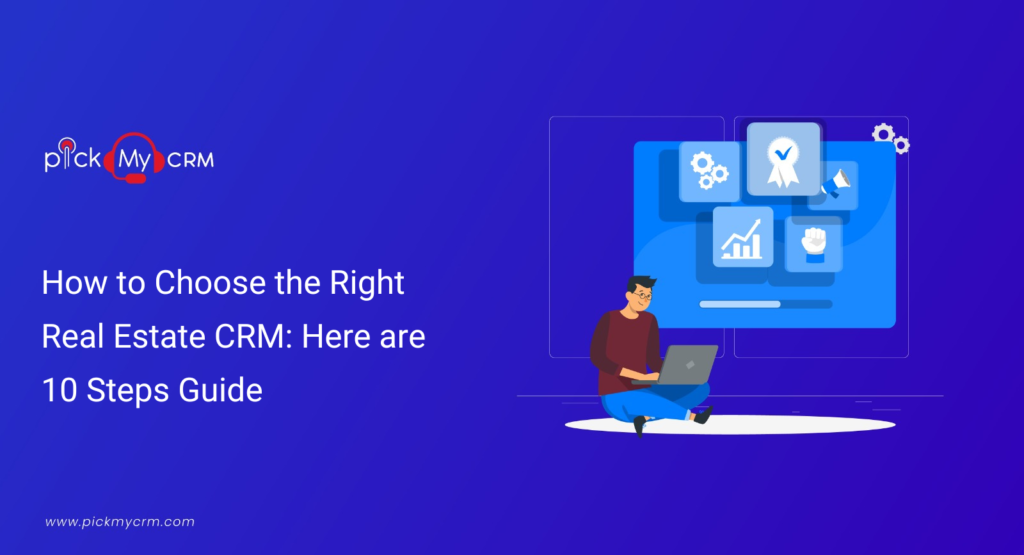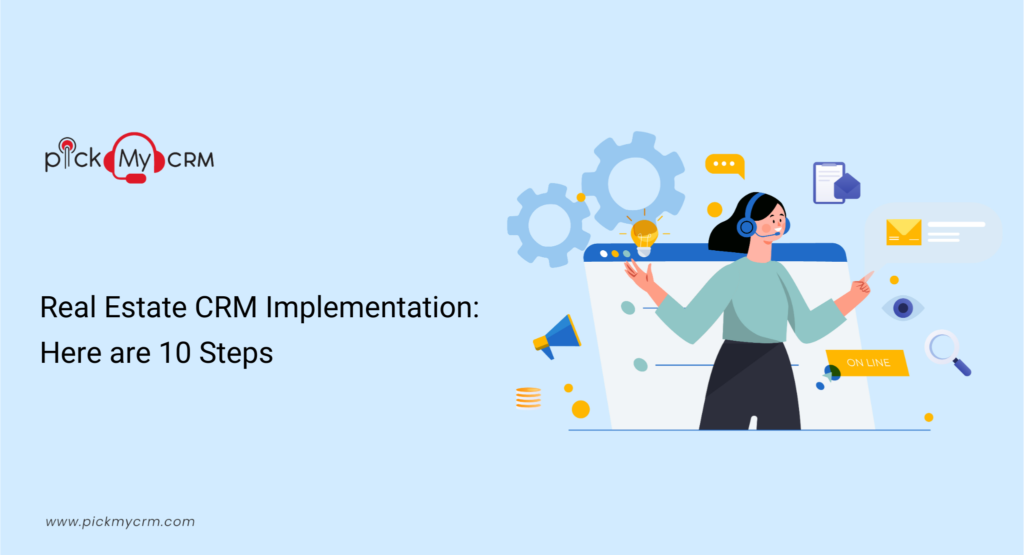How to Choose the Right Real Estate CRM: Here are 10 Steps Guide

10 Tips for Selecting the Right CRM
How to choose the right Real Estate CRM for your needs. When selecting the right CRM for your real estate business, consider the following tips,- Identify Your Specific Needs
- Research and Compare Options
- Consider Scalability
- Request Demos and Trials
- Integration Capabilities
- Evaluate Mobile Accessibility
- Assess Customer Support
- Check Security and Data Privacy
- Consider User Adoption
- Plan for Growth and Flexibility
Why Choose a Real Estate CRM?
The benefits of choosing the right CRM for your real estate business are manifold. A CRM system helps manage leads, automate follow-ups, provide data insights, enhance client relationships, and drive business growth.How to Choose the Right Real Estate CRM: Here are 10 Steps
Selecting the perfect Real Estate CRM for your business is a pivotal decision that can significantly impact your operations and success. With a wide array of options available, it's essential to follow a systematic approach to ensure choosing the CRM that best aligns with your business goals and needs. Here a guide you through the process,Understand Your Needs and Goals
To Effectively choose a Real Estate CRM, start by comprehending your business needs and goals. Identify what areas of your real estate operations need improvement or automation. Consider factors like lead management, client communication, and transaction tracking. This understanding will guide you in selecting a CRM that caters precisely to your requirements.Research and Compare
When choosing the perfect Real Estate CRM, comprehensive research and comparisons Play a crucial role in decision-making. With numerous CRM providers offering a variety of features and functionalities, taking the time to research and compare your options will help you make an informed choice that aligns with your business needs. Here's how to effectively Research and Compare different CRM solutions,- Identify Providers: Create a list of reputable CRM providers catering to the real estate industry.
- Explore Features: Investigate features like lead management, automation, and communication tools.
- Read Reviews: Consider user reviews and testimonials to gauge user experiences.
- Compare Pricing: Evaluate pricing models and match them to your budget and needs.
- Assess Support: Look for responsive customer support options.
- Seek Recommendations: Ask peers or associations for trusted recommendations.
- Make an Informed Decision: Create a pros and cons list for your top CRM choices before deciding.
User-Friendliness and Ease of Use
Consider the user interface, customization options, and mobile accessibility. A user-friendly CRM with intuitive navigation and customizable features will ensure smooth adoption by your team. Mobile accessibility also holds significance, enabling you to access and update information while on the move.Data Security and Privacy
Protecting sensitive client data is paramount. Look for CRM providers that prioritize data encryption, comply with industry regulations (e.g., GDPR), and offer backup and disaster recovery solutions.Integration and Scalability
Select a Customer Relationship Management (CRM) system that effortlessly incorporates itself into your current Array of tools and software solutions. Consider its scalability to accommodate your business growth and evolving needs. Additionally, explore the availability of third-party integrations that can enhance the CRM's functionality.Reputation and Customer Support
Research the CRM provider's reputation and track record in the industry. Review customer feedback and testimonials to assess their level of satisfaction. Additionally, evaluate the level of customer support offered by the CRM provider. Responsive and reliable support can make a significant difference in your CRM experience.Cost and Pricing Model
Compare pricing plans and subscription models offered by various CRM providers. Consider the value provided by each CRM and assess any additional costs or hidden fees. Balance your budget with the features and benefits offered by the CRM.- Subscription Options: Explore a variety of subscription plans based on their features and usage levels.
- Monthly vs. Annual: Decide between monthly payments or annual contracts, which might lead to potential cost savings.
- Hidden Expenses: Be sure to check for any hidden costs, such as setup fees, training expenses, or customization charges.
- Scalability Consideration: Opt for a plan that can easily accommodate your business's growth without substantial price increases.
- Tiered Plans: Examine tiered plans with a Range of Features suited to your specific requirements.
- Customization Flexibility: Some CRMs provide the option of customizable plans tailored to your unique requirements.
- Free Trial Availability: Prioritize CRMs that offer free trials, enabling you to test functionalities before committing.
- Value Proposition: Evaluate the offered features against the price to ensure you're receiving optimal value.
- ROI Assessment: Determine how the CRM's benefits outweigh its costs for your business through thorough analysis.
- Negotiation Possibilities: Explore the Options of negotiating terms with CRM providers for more favorable conditions.
Trial and Demo Periods
Take advantage of free trials or demo periods offered by CRM providers. Utilize this opportunity to test the CRM's features and functionality. Gather input from your team during this trial period to confirm its alignment with your requirements.Making the Decision
Create a shortlist of CRM options that meet your criteria. Compare features, usability, pricing, and feedback from your team. Seek insights from industry experts, attend webinars, or participate in forums to make an informed decision.Implementation and Onboarding
Once you've chosen a CRM, develop an implementation plan and timeline. Coordinate training and support for your team to ensure a smooth transition. If you're migrating data from existing systems, plan the process carefully to minimize disruptions.How to Choose the Real Estate CRM: Here are some Unveiling Benefits
Choosing a Real Estate CRM (Customer Relationship Management) offers numerous benefits for real estate professionals. Here are some key advantages,- Streamlined Operations: A centralized platform for client data, property listings, and transactions simplifies lead management and communication tracking.
- Improved Client Engagement: Access to centralized client information enables personalized service and automated follow-ups for higher conversions.
- Data-Driven Insights: Harness analytics to fine-tune strategies, pinpoint leads, and drive informed decisions for improved results.
- Mobile Accessibility: Stay connected and responsive on the go through mobile apps for immediate client needs.
- Marketing Optimization: Manage campaigns, track engagement, and refine strategies for improved marketing results.
- Increased Sales and ROI: Effective lead management, nurturing, and data insights lead to higher conversions and repeat business.



